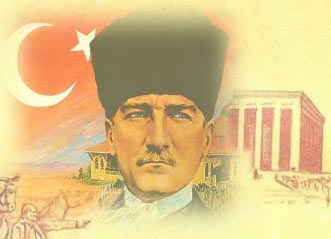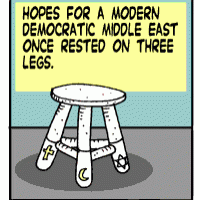![]()
Wed, Nov 21, 2012 | by Toni Alaranta
This article was first published in the Turkey Analyst, vol. 5 no. 22 (www.turkeyanalyst.org), a biweekly publication of the Central Asia-Caucasus Institute & Silk Road Studies Program Joint Center. © Central Asia-Caucasus Institute & Silk Road Studies Program Joint Center, 2012.
During the last decades, Kemalism, the modernization ideology of the Republic of Turkey, has been vehemently criticized. Many commentators, both Turkish and Western, have declared Kemalism to be outdated and harmful to Turkey. Especially in the West, the enthusiastic descriptions of Kemalist modernization, prevalent during the first decades of the Republican regime, have been replaced by accusations of Kemalism as being a vestige from the past; some have even defined Kemalists as ‘fascists’. However, the current fashion of defining the Kemalists as ‘authoritarian secularists’ is not very helpful in order to understand why a significant number of secular middle class Turks are still ready to support the basic tenets of Kemalism.
Background
Conventional wisdom holds that Kemalism is in contradiction with liberalism, and the most frequent claim accompanying this is that Kemalists are authoritarian elitists. Further, it is often claimed that with pro-liberal Islamic conservatives currently in power, Turkey is in the process of liberating itself from the Kemalist ‘tutelary democracy.’ This assertion presupposes that Western liberal tradition has been crucially non-elitist, and essentially non-tutelary. However, the European liberal tradition has in fact been steeped with pragmatic elitism; to secure the liberal institutions until the majority of population had been tutored into “rational” and educated citizens was originally a liberal preoccupation.
Contemporary Kemalist intellectuals — Vural Savaş, Yekta Güngör Özden, Erol Manisalı, Ahmet Taner Kışlalı (who was assassinated in 1999), and Metin Aydoğan being among the most prominent — similarly argue that Kemalist ideology embodies the Enlightenment project in Turkey. This argument is based on the idea of progress and development acquired through the continuing enlargement of the sphere of human reason.
In this sense Kemalism is thoroughly similar to a liberal tradition that has historically been informed by a secular-humanist, progressive philosophy of history. Contemporary Kemalist intellectuals see themselves as heirs to an original liberal philosophy; from their perspective, current Western liberalism, with its emphasis on pluralism and postmodern cultural relativism that leads to a downgrading of the sovereign nation-state, privileging minority rights, stand in opposition to the original, core liberal idea of fostering rational, educated citizens: to encourage Kurdish ethnic separatism for instance, is seen as a concession to feudal structures while the effects of Islamic conservatism not least on gender relations is feared. According to the Kemalist intellectuals, theirs is an ideology of culture revolution, an effort to create ‘a new human being.’
The Kemalist philosophy of history is, in the spirit of Enlightenment age liberalism, characterized by the belief in progress acquired through the enlargement of the sphere of human rationality. The aspired culture revolution, in turn, implies an optimistic view of human nature; humans are perceived as rational beings capable to adapt to the new circumstances created by the Kemalist revolution. The Kemalist idea of human nature is based on the idea of humans as rational and capable for change, and the Kemalist idea of ‘constant revolution’ presupposes that change is also constant.
Further, the definition of the Turkish nation-state as the particular social context for the universal emancipation project of liberalism implies a communitarian view of human nature, one which holds that individuals are ultimately shaped by the social circumstances provided by the national community.
Implications
The other, as significant, conviction espoused by Kemalist intellectuals concerns the primacy of nation-states. In the current Kemalist perspective, the nation-state remains the most advanced and progressed form of social organization, and the threat posed to it by globalization is seen as a degenerating process. This position is in turn strongly related to a view of history as essentially characterized by an ‘eternal struggle of life,’ where strong, advanced nations unashamedly make use of weak, underdeveloped nations.
The priority of nation-states as the main units of social organization has also been a major component in modernization theory. In this sense, Kemalist understanding of progress, and the assumption that the nation-state is the main executor of the modernizing project, is an internally coherent position. But, Kemalism also combines liberalism and conservatism, in a way that mirrors the evolution of European thought immediately after the age of Enlightenment. Anti-Enlightenment currents of thought — conservatism and romanticism — not only challenged the Enlightenment’s emphasis on reason and modernity but also transformed the ‘universal man’ into a member of a territorially defined nation-state. A similar process has occurred in Kemalism, as it became explicitly claimed that the emancipation of humanity through science and rational thinking needed to have its material realization in a nationally defined political community; according to Kemalist ideology the Turkish nation-state is thus ‘utopia materialized.’
One can claim that in the West, which has reached the stage of mature liberal democracy — the norm against which Turkey is pejoratively defined as a ‘tutelary democracy’ — there is a consensus on fundamental values; no one seriously challenges the secular form of the regime, or the sovereignty of scientific education, at least not in Europe. In Turkey however, at least from the Kemalist perspective, there exists a social polarization that expresses a profound disagreement over those fundamental values. Contemporary Kemalist intellectuals’ texts are filled with quotations from European and American politicians and businessmen, whose views are, on the other hand, equally informed by explicit arguments for their own nations’ uncompromising prerogatives and national interests, which must be secured, if necessary, by force. Thus, upon the in essence liberal Kemalist philosophy of history is constructed the doctrine of ‘militant Atatürkism’ which is not liberal but emphasizes nationalism and an individual’s possibility for meaningful life only within a national community.
In contemporary Kemalism, there is a strong tendency to conceive globalization as the ultimate victory of markets over all other values. Globalization is vilified as the marketization of the whole human life-world. The discourse of globalization is associated with those who are the winners of this process, a rich minority which is getting richer day by day. Kemalist ideology erects the independent nation-state to the obstacle to the unrestrained free market. This is in turn why, according to the Kemalist intellectuals, the European Union and the United States have declared a “war” against Kemalism. The Kemalists claim that Europeans and Americans defend and advocate the views of the Islamic conservatives because the latter are — supposedly — willing to play their game.
In Turkey, according to contemporary Kemalism, the Islamic conservatives exploit religion for political purposes, making the religious identity politics as a tool of legitimacy. In their challenge to the secular Turkish nation-state, the Islamic conservatives are also accused of having weakened an egalitarian and difference-blind social order. One part of this project is the doctrine of privatization, in which the state loses all its tools to provide decent health care, education, employment, and other social benefits equally to all its citizens. However, this vision of the Kemalist intellectuals of Islamic conservatism as a promoter of neo-liberalism in alliance with Western “imperialists” is challenged by the fact that the ruling Justice and Development Party (AKP) have in fact made access to health services universal during its reign.
Conclusions
To most Western observers, Turkey’s internal politics have produced a major ‘puzzle: those who were traditionally anti-Western have during the last decade switched place with those who were traditionally pro-Western. In the commonly accepted Western perspective, the Islamic conservatives in power, sometimes defined as ‘Muslim democrats,’ represent the reformist, pro-Western and pro-European force in Turkey. The group of allegedly ‘Muslim democrats’ are thus seen as Turkey’s equivalents to Western liberals — committed to political and economic liberalism, enhancement of basic individual rights, and generally opposing the nationalist and state-centered tradition of Kemalism.
However, in the long run, the ruling AKP’s emphasis on Turkey’s essential civilizational difference from the Western world, and the religiously inspired world-view that animates much of its grass roots support — the networks of various religious fraternities — will arguably put Turkey on a different orbit from the West. The Islamic political articulation on the grass roots level is hardly consistent with pro-American or pro-European liberalism.
Meanwhile, the denial of liberalism that is undeniably inherent in Kemalism is not of the same kind as in fascist or communist ideologies. The denial is only partial, and concentrates, firstly, on what is viewed as liberalism’s excessive individualism, and, even more importantly, on economic liberalism’s economic inequality. Insofar as Kemalist intellectuals have come to define their ideology, it does not have liberal democracy as its goal, but rather social democracy.
And whatever its shortcomings, it ought to be recognized that on a deeper level, Kemalist ideology is not in contradiction with the fundamental tenets of the Enlightenment tradition; as Western liberals of earlier generations easily recognized, Kemalism is in this sense an European inspired secular-humanist project; the synthesis between liberalism and socialism that current Kemalist intellectuals seek to promote should be taken seriously and not dismissed as anachronistic by Westerners. It might very well serve to anchor Turkey to the West and sustain democratization.
Toni Alaranta is a research fellow at the Black Sea and Central Asia Research Center, Middle East Technical University, Ankara. His doctoral thesis (University of Helsinki, 2011) is titled “The Enlightenment Idea of History as a Legitimation Tool of Kemalism in Turkey”.



 RSS
RSS













Latest Comments
Hello Mike, Thank you for your positive feedback to the article. I felt there wasn’t too much critical analysis of ...
Thanks for this considered and well constructed article. A follow up article on the manner in which the editorial contro...
THE CLUELESSNESS OF CLAIMING THAT OBAMA'S MIDDLE EAST POLICIES WERE A FAILURE CANNOT BE FURTHER FROM THE TRUTH, WHAT THE...
As long as Obama is the president of the usa do not trust the us government......
Thank you for an good read....